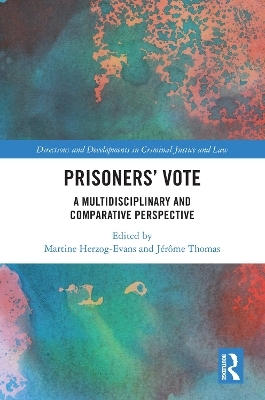
Prisoners' Vote
Routledge (Verlag)
978-1-032-22877-8 (ISBN)
By adopting a comparative approach to explore the legal systems of very different jurisdictions, such as the former Eastern Bloc, England, Ireland, the USA and France, the book reveals a recent trend in opening up the right to vote. It also looks at the recommendations of international and European institutions which, while relatively cautious, nevertheless support such progress. Examining the issue from a criminological viewpoint, the book investigates the role that prisoners’ votes could play in the social integration of these individuals into the community through political inclusion as citizens. Offering legal, theoretical and empirical bases, it blends a variety of perspectives to help readers establish an understanding of how prisoners' voting could contribute to improving their attachment to society and its values.
Concise and direct, Prisoners' Vote will be of great interest to upper-level students and scholars of law, criminology, sociology, criminal justice, and political science. It should also appeal to practitioners working in the criminal justice system and policy makers reflecting on whether and how, to open the right to vote to prisoners.
Martine Herzon-Evans teaches penology and criminology at the Université de Reims-Champagne Ardennes, France. Her research interests range from legitimacy of justice, sentences, problem-solving courts, offender treatment, prisons and reentry and domestic violence. Jérôme Thomas is a lecturer in information and communication sciences at the university of Reims Champagne-Ardenne / IUT de Troyes (France). His work focuses on the forms of expression, speech, and communication that occur in institutions of deprivation of liberty and control, such as psychiatric hospitals and prisons.
Introduction
Martine Herzog-Evans and Jérôme Thomas
PART 1 - Can Prisoners Vote?
Waking Up to Re-enfranchisement
Chapter 1 - Prisoner Voting Rights and International law
Steve Foster
Chapter 2 - Incarcerated Individuals’ Right to Vote in the Czech Republic
Petra Zhrivalova and Tereza Trebjalova
Chapter 3 - Criminal Disenfranchisement in Old Democracies: Comparing France, the UK, and, the United States
Alice Dejean de la Batie
PART 2 - Should Prisoners Vote?
Chapter 4 - To Feel Part of a Wider Community: The Case for Prisoner Voting
Cormac Behan
Chapter 5 - US disenfranchisement and Re-enfranchisement explained
Christopher Uggen, Robert Stewart and Emma Lookner
Chapter 6 - Prisoners’ Vote in France: Political Capital, Social Bond, and Desistance
Martine Herzog-Evans and Jérôme Thomas
Chapter 7 - Waking Up to Re-enfranchisement
Fergus McNeill
| Erscheinungsdatum | 18.04.2024 |
|---|---|
| Reihe/Serie | Directions and Developments in Criminal Justice and Law |
| Zusatzinfo | 1 Tables, black and white; 4 Line drawings, black and white; 4 Illustrations, black and white |
| Verlagsort | London |
| Sprache | englisch |
| Maße | 156 x 234 mm |
| Gewicht | 460 g |
| Themenwelt | Recht / Steuern ► EU / Internationales Recht |
| Recht / Steuern ► Strafrecht ► Kriminologie | |
| Recht / Steuern ► Strafrecht ► Strafverfahrensrecht | |
| Sozialwissenschaften ► Politik / Verwaltung | |
| ISBN-10 | 1-032-22877-6 / 1032228776 |
| ISBN-13 | 978-1-032-22877-8 / 9781032228778 |
| Zustand | Neuware |
| Informationen gemäß Produktsicherheitsverordnung (GPSR) | |
| Haben Sie eine Frage zum Produkt? |
aus dem Bereich


